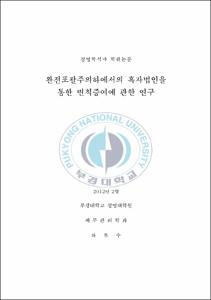완전포괄주의하에서의 흑자법인을 통한 변칙증여에 관한 연구
- Abstract
- A Study on the Irregularity Gift by Profitable Corporation under the All-Inclusive Principle
Ha, Bok Su
Department of Tax Administration
Graduate School of Business Administration
Pukyung National University
Abstact
Gift tax has been ineffective in blocking the gratuitous transfer of wealth for the following two reasons. First, if a donor and a donee have the identity of interests, it is easy for them to conceal the gift itself. Second, we have adopted the enumerating taxation method in which gift tax can be imposed only when the taxation conditions of deemed gift and the calculation method of distributed property have been enumerated in the inheritance and gift tax laws. To solve these problems, the conditional all-inclusive principle, which is a more advanced form compared with the simple enumeration method, was introduced in January, 1999. Under this principle, gift tax could be levied in case a transaction was similar to the ones enumerated in the law and ordinance and was made through a third party.
In January, 2001, it was transformed to the all-inclusive principle by type. Under the principle, six types of capital transactions in which anomalous transactions had taken place frequently had to be specified in the inheritance and gift tax laws and gift tax could be levied if cases were similar to the six specified capital transactions. It was true that the scope of assessment over deemed gifts was greatly expanded, but the gratuitous transfer of wealth could not be deterred completely, given that most cases of anomalous inheritance and gift occurred through capital transactions. Furthermore, the appearance of various financial commodities and the development of information communication have increased the possibility of new types of transactions. Therefore, the complete all-inclusive principle (CAIP, hereafter) has come into effect since January 1, 2004 in order to prevent various means of anomalous heredity of wealth.
The objective of this study is to identify problems and demonstrate some reform measures for the problems when gift taxes are levied especially on irregularity gift by profitable corporation under the all-inclusive principle. The primary results of the study show following three areas of the problems and three reform measures for the problems, respectively.
Firstly, the realized time for the gift tax under CAIP is the time "when the value of properties is acquired." But the acquisition time of property is not always the same as the time when the value of the property is increased. In order to improve this problem, the gift tax law should have to clarify the time when the property being gifted is increased.
Secondly, the CAIP rule in the gift tax may be unconstitutional because the interpretation of tax law will be based on tax authority's own will due to the all-inclusive and abstract characteristics of the gift tax rule under the CAIP. In order to improve this problem, the gift tax law should delegate detailed taxation condition to enforcement ordinance and/or detailed enforcement regulation of the gift tax.
Thirdly, when stocks of a corporation are gifted to third party shareholders, the resulting tax may be levied on both gift tax and corporation tax (or comprehensive income tax). This results in double taxation problems. In order to prevent these double taxation problems, the tax authority levies gift tax first when the value of the property is increased, and then levy capital gain tax by deducting prepaid gift tax after the transferring transaction have been completed.
- Issued Date
- 2012
- Awarded Date
- 2012. 2
- Type
- Dissertation
- Keyword
- 완전포괄주의
- Publisher
- 부경대학교 경영대학원
- Affiliation
- 부경대학교 경영대학교 세무관리학과
- Department
- 경영대학원 세무관리학과
- Advisor
- 김태용
- Table Of Contents
- Abstract iii
제 I 장 서 론 1
1. 연구의 필요성과 목적 1
2. 연구방법 및 연구범위 3
제 II 장 완전포괄주의의 이론적 배경 4
1. 완전포괄주의의 개념 4
2. 완전포괄주의와 조세법률주의와의 관계 9
3. 외국의 포괄주의 입법례 14
제 Ⅲ 장 흑자법인 변칙증여 과세사례와 찬반논쟁 21
1. 변칙증여의 유형 21
2. 흑자법인 변칙증여에 대한 과세사례 27
3. 찬반 논쟁 35
제 Ⅳ 장 흑자법인 변칙증여의 문제점과 개선방안 45
1. 증여세 납세의무의 성립과 확정 45
2. 법령의 문제점 및 개선방안 46
3. 과세권의 남용가능성에 따른 개선방안 55
4. 과세자료의 인프라망 구축에 대한 개선방안 56
5. 또 다른 완전포괄주의 사례(일감몰아주기)에 대한 대책 59
제 Ⅴ 장 결 론 64
참 고 문 헌 67
- Degree
- Master
- Files in This Item:
-
-
Download
 완전포괄주의하에서의 흑자법인을 통한 변칙증여에 관한 연구.pdf
기타 데이터 / 899.58 kB / Adobe PDF
완전포괄주의하에서의 흑자법인을 통한 변칙증여에 관한 연구.pdf
기타 데이터 / 899.58 kB / Adobe PDF
-
Items in Repository are protected by copyright, with all rights reserved, unless otherwise indicated.